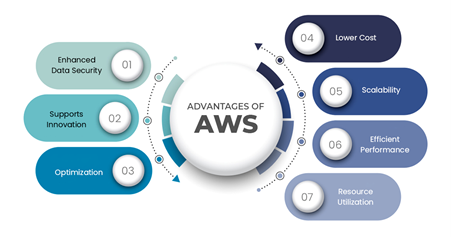Businesses across the world are replacing their legacy, on-premise systems with flexible, scalable, and cost-effective computing technology – the cloud. Migration to a cloud platform offers great advantages to businesses of all sizes. Cloud plays an important role in improving productivity and streamlining business operations.
Cloud computing became increasingly popular after the COVID 19 pandemic as it helped businesses to manage their operations, people and resources remotely. Cloud technology made it possible for the global economy to limp back to normal.
According to Statista, global cloud infrastructure service revenues crossed $50 billion for the first time in the fourth quarter of 2021 with Amazon and Microsoft accounting for more than half of cloud infrastructure revenues.

What is AWS?
Amazon Web Services (AWS) is a cloud computing platform that provides computer resources as a service, freeing businesses from spending money on tech infrastructure and focussing on their core competencies. AWS helps businesses quickly adapt and respond to a rapidly changing technological environment irrespective of the size and nature of the business.
In a cloud environment, users may be able to access data from any place anytime, thereby, avoiding the limitations of a physical data center. The IT infrastructure may be rescaled or reduced in response to demand to maintain their investment and operations as per computing, data storage, or information services.
AWS employs a sound framework to guide and assist businesses in adopting best practices using cloud services.
Migrating to AWS
AWS offers a wide range of migration solutions that can help businesses move workloads from on-premises environments, hosting facilities, or other public clouds. AWS allows choice from a plethora of services that covers transferring and modernizing applications, websites, databases, storage, physical and virtual servers, or in some cases even entire data centers. What this requires is a team of experienced tech practitioners who can help an enterprise to move to the AWS cloud to improve productivity. Gemini Consulting & Services has helped many enterprises across the globe in migrating to AWS. Contact us to understand the advantages offered by AWS and how your organization can benefit from it.

Enhanced Data Security: There is this perceived threat of hacking into IT infrastructure and business apps with the shift into the cloud. Moving to the cloud enables organizations to install security, governance, and compliance safeguards that are required for their specific business. The AWS shared responsibility defines the security of the cloud (service itself) and that within the cloud (business). Security of the cloud, the infrastructure, software, hardware, networking, and physical facilities are handled depending on the choices of service made.
Lower Cost: AWS is a lucrative option for all kinds of businesses. Having in-house hosting services requires the same investment regardless of the resources needed. With AWS, you may pay-as-you-go upgrade or downgrade depending on your requirements. AWS is affordable, thereby, enabling start-ups to leverage the power of the cloud. The serverless architecture eliminates the need to operate using physical servers, which can be tedious as well as cost intensive. By managing services via the cloud, businesses can not only lower their costs but also improve performance efficiency.
Supports Innovation: Businesses can comfortably explore new technology such as machine learning and artificial intelligence, which are not usually possible on-premise. Cloud-native technology like Kubernetes containers and data lakes can also be quickly deployed.
Scalability: The ability to use programming models, databases, operating systems and architecture is a huge benefit as almost every AWS product and service is compatible with most coding languages. This helps organizations to save time and money on hiring additional specialists. With AWS cloud, enterprises do not need to predict the number of services or resources the application will use over the years while implementation. Hence, it prevents overestimation and redundancy.
Optimization: There are many types of AWS resources, from standard databases to artificial intelligence (AI) and data lakes. With the help of these systems, businesses have an option to optimize an architecture to best suit the estimated workload. Organizations can use data analysis software to find the most useful programs for their specific business or industry or seek assistance from an AWS partner network.
Efficient Performance: AWS performance is unquestionably faster than the performance of internal systems. Execution is also easy compared to other cloud services. AWS uses countless data centers across the world, enabling users who request data from the nearest geolocation to obtain the information faster.
Reviewing and monitoring are two of the best practices of performance efficiency and AWS is constantly innovating to meet customer demands. AWS services like Amazon CloudWatch can monitor an entire workload and provide the business with information and actionable insights, helping in the identification of opportunities and scope that can improve efficiency.
Resource Utilization: Running an application from an internal server is an additional task for developers. Trouble associated with user-login, being able to run some apps on specific configurations alone, are additional challenges. IT teams realize that their bandwidth should ideally accommodate more strategic initiatives. When businesses move into the AWS environment, business applications will easily be able to function more smoothly as the service provider takes over the support function.
Businesses can use technology as a service by assigning members of their IT team to the task of learning, hosting, and handling new technological services. Technologies such as NoSQL, a database that stores and retrieves data, help resolve complex tasks quickly and efficiently, allowing members of the team to focus on other core competencies of the business. NoSQLs are used more in cutting-edge techs like big data and real-time applications as they are a lot faster and more flexible than other database types.



